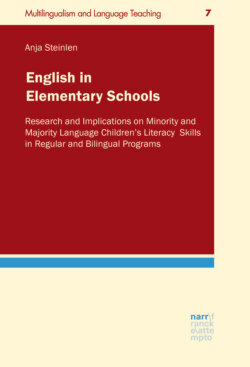Читать книгу English in Elementary Schools - Anja Steinlen - Страница 29
На сайте Литреса книга снята с продажи.
2.3.9 Studies on L1 and FL reading and writing in bilingual programs
ОглавлениеIn Germany, bilingual programs have been examined in several large-scale studies focusing on one-way immersion and two-way immersion programs. The MOBI-project (“Monolinguales und bilinguales Lernen”) ran from 2005 to 2009 (e.g., Gebauer et al., 2012, 2013; Kuska, Zaunbauer & Möller, 2010; Zaunbauer & Möller, 2006, 2007, 2010; Zaunbauer, Bonerad & Möller, 2005; Zaunbauer, Gebauer & Möller, 2012, 2013) and involved over 650 elementary school students in Northern Germany attending either bilingual (immersion) programs (where all subjects were taught in English except for German-as-a-subject), i.e. one-way programs, or regular EFL programs (where English was taught as a subject), respectively, from grade 1 onwards. The focus of the MOBI-project was on the development of cognitive skills and language skills, such as German reading and writing, English vocabulary and reading, as well as the development of content knowledge in mathematics and science, which were assessed mainly with standardized tests. In grade 4, the data included around 300 students in immersion programs (e.g. Zaunbauer et al., 2012).
The aim of the second project is to evaluate the two-way immersion programs of the “Staatliche Europa-Schulen Berlin” (SESB, e.g., Möller et al., 2017). Teaching takes place in German and in one of the respective partner languages, i.e., English, French, Greek, Italian, Polish, Portuguese, Russian, Spanish, or Turkish, and half of the teaching time is devoted to one of the two languages. The composition of the classes generally (but not exclusively) consists of 50% of learners with the first language German and of 50% of learners with the respective partner language as L1. The teachers of the subjects taught in the partner language usually speak the partner language as L1. The focus of this project is on the development of reading skills, mathematics and science in German and the partner language. The results are also compared to the development of other students in monolingual programs. Altogether, 789 students in grade 4 participated in this study.
In 2015, the Federal State of Bavaria initiated a project called “Lernen in zwei Sprachen – Bilinguale Grundschule Englisch” (Learning in two languages – bilingual elementary school English), with 21 elementary schools located all over Bavaria. The students in grades 1-4 were taught in two languages (i.e. German and English) in the subjects of mathematics, science, art, music and PE, corresponding to less intensive bilingual programs with less than 50% conducted in the target language English. Instruction in the bilingual classes was based on the competency expectations formulated in the curriculum LehrplanPLUS Primary School. Teaching units or phases in the subjects were conducted in English on suitable topics and occasions. The respective teacher selected topics suitable for the English language, and the focus was on implicit teaching of the English language. Lessons in the bilingual classes were given according to the timetable, i.e. without additional time quotas. The final report included data from 430 fourth graders (Böttger & Müller, 2020).
Since 2012, Steinlen and Piske have conducted studies on L1 and L2 language skills in three bilingual elementary schools in Germany. The main focus of these studies has been on the development of German and English by minority and majority language students. Most of the studies took place with students attending a partial immersion program offered by the Hügelschule (Tübingen, Germany). As another cohort at the Hügelschule has been added each year, the sample size increases by publication date, with more recent samples containing cohorts from earlier studies (e.g., Steinlen, 2016, 2017, 2018a, b; Steinlen & Piske, 2013, 2015, 2016a, b, 2018a,b, 2020, i. pr., Yadollahi et al., 2020). Other studies of this project dealt with a less intensive bilingual program at the Muhliusschule in Kiel (Steinlen & Gerdes, 2015; Steinlen, 2018a) and with an intensive partial immersion program at the Platanus Schule in Berlin (Steinlen & Piske, 2018c), where 20% and 70% of the teaching time, respectively, was conducted in English. Focusing on reading and writing, the results of these projects will be presented below.
